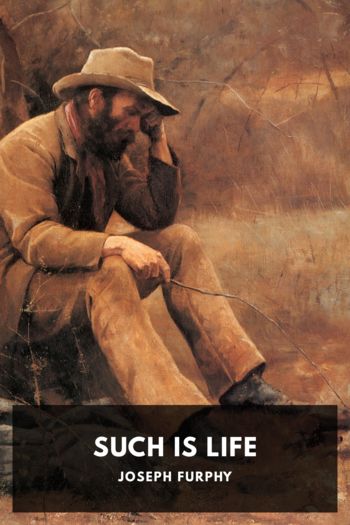Such Is Life - Joseph Furphy (philippa perry book txt) 📗

- Author: Joseph Furphy
Book online «Such Is Life - Joseph Furphy (philippa perry book txt) 📗». Author Joseph Furphy
It was some minutes before I became my own philosophic self again. Then I crept to the corner of the stack, and reconnoitred the homestead. Near the backdoor, Jim had just saddled the horse, and, with the near flap resting on her head, was taking up the slack of the girth with her teeth, whilst her left hand, grasping the rein close to the horse’s mouth, prevented the animal from taking a piece out of her. Presently Dad trotted out of the house and took possession of the horse, while she stepped back a pace. Then she seemed to say something of great pith and moment, for Dad paused, evidently questioning her. At last he returned hastily into the house, leaving the horse again in her charge.
I made an effort to concentrate my remnant of faith on a double event, namely, that he wouldn’t delay long, and that he would come my way when he started. He, at least, was a man and a brother. I would interview him as he passed, and—
Faith scored. He didn’t delay long, and he came my way straight. But he came on foot, and he came with a gun; speaking over his shoulder to Jim as he bustled past. Even in the distance, I fancied her attitude was that of a girl who had imprudently set in motion a thing that she was powerless to stop.
I couldn’t believe in the reality of the spectacle. But the illusion was there, palpable enough; and it consisted chiefly of a determined-looking man hurrying toward the stack, his right hand on the lock of a long duck gun, his left partly along the barrel, and the cheek of the stock resting against his hip. Beyond doubt he was after something, and beyond doubt he meant mischief. I glanced behind me, and round the expanse of bare fallow, but there wasn’t even a magpie in sight. At the same time, the sportsman’s general bearing, his depressed head and downward vigilance, showed that he was stalking ground game, and wasn’t interested in anything perched on the stack. This was apparent to me by the time he had got within thirty or forty yards, and was holding the gun ready to clap to his shoulder. Also I noticed that several other women had joined Jim, and were watching his progress. Having now approached within point-blank range, he deployed to the left, in order to outflank whatever he was after.
Of course, you would have rushed him; you would have wrenched the gun from his grasp, and broken it across your knee; you would have despoiled him of his ⸻, and cuffed him home with ignominy. Yes, I know. So would I.
What I actually did, however, was to make two kangaroo-rat springs, which landed me in the bottom of the drain. I called to mind that, less than halfway down to the lagoon, I had noticed a deep, narrow, miniature ravine, eaten into one side of the drain by a tributary channel, and well sheltered by the foliage of large docks, now run up to seed. In thirty seconds, I was rustling into this friendly cover. There my confidence speedily returned, and, raising my head among the seeding stems, I noted the guerilla tactics of that white savage.
Still holding his weapon at the ready, he had circled round the stack till his view commanded all its recesses. Then he looked up and down the drain, peered under the culvert, and cast his eye across the fallow in every direction. Apparently satisfied, he threw the gun on his shoulder, and started off toward the lower end of the garden. I saw him disappear in the whipstick scrub, between the garden and the lagoon; then I backed out into the drain.
But I could gain nothing by staying there, and just as little by going back to my camp; whereas from the stack I could see any advantage that might offer itself, either about the house or across the lagoon. And, logically, the stack ought now to be one of the safest places in the province. So I returned to my old post, and, almost hopelessly, brought one eye to bear on the homestead.
I was just in time to catch occasional glimpses of Dad’s head above the foliage of the fruit trees, as he rode down along the farther side of the garden to the dry crossing in the lagoon; and presently I saw him go up the opposite bank, and disappear in the scrub. Another instance of erratic shunting on my part. If I had stayed at my camp, I might have accosted him on neutral ground, without his gun, and with his mind unpoisoned by any of Jim’s hysterical imaginings. What on earth had she told him about me? She had certainly told him something.
Just at this moment, the sun, which had risen behind a dense bank of clouds, suddenly burst forth. The colourless monotony of the scene flashed into many-tinted loveliness under the magic pencils of golden light; and, against the sombre background of river timber, a pair of white ⸻, hanging, with other drapery, on a line between the house and garden, leaped out in ravishing chiaro-oscuro!
A lifelong education, directing the inherent loyalty of human nature, invests anything in the shape of national or associational bunting with a sacredness difficult to express in words. Loyalty to something is an ingredient in our moral constitution; and the more vague the object, the more rabid will be our devotion to the symbol. Any





Comments (0)